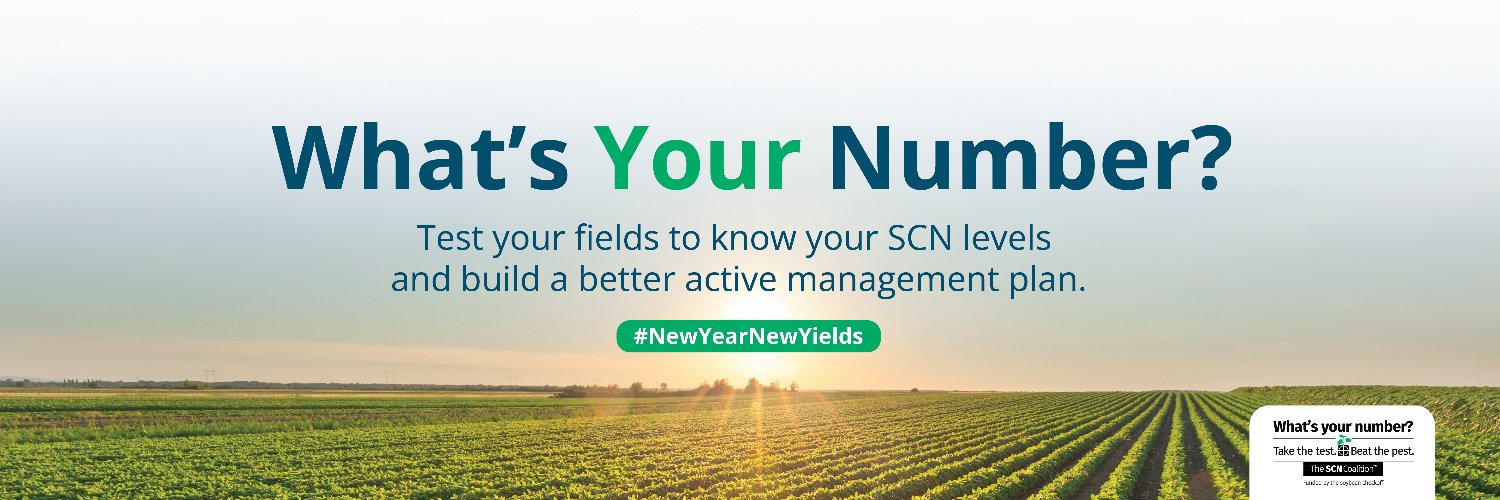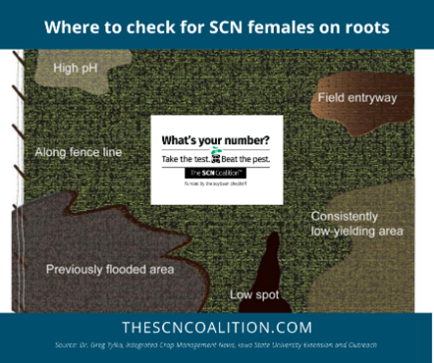
The SCN Coalition
@TheSCNCoalition
The SCN Coalition is a public/checkoff/private partnership formed to help the agricultural industry speak with one voice about soybean cyst nematode management.
8 to 12 more bu/A is nothing to shrug off – especially when active SCN management can help you achieve it. @ValentUSA expert Dair McDuffee explains why testing soil for SCN is the first step in keeping low #SCN numbers low. Access his tips: bit.ly/4nT8ok8
With increasing resistance to PI 88788, active SCN management involves more than just planting an SCN-resistant variety. Hear @ValentUSA experts share why Aveo EZ nematicide could be a helpful yield-boosting tool: bit.ly/4nV3Vxp
“Knowing what’s happening in each field with SCN gives you more information to make educated decisions about how to manage that field,” says @IowaStateU Nematologist Greg Tylka. That info can guide seed treatment decisions, variety selection, crop rotation plans and more. To find…
#SCN is the most important soybean pathogen in Michigan, which is why @MSUExtension experts compiled these state-specific resources to help you this #Grow25: bit.ly/44NQdVk

The sad truth is that once you have SCN you always have SCN. Good news – the right tools can help you #BeatThePest. bit.ly/3TEwD7F

25,000+ samples helped create an algorithm that gives you two key estimates for each field: 1️⃣ SCN’s impact on yield 2️⃣ SCN’s impact on profits #KnowYourNumber with the SCN Profit Checker: bit.ly/4eIsY2A
Smart moves beat SCN, which is why @ValentUSA recommends a multifaceted approach to #BeatThePest. Start low and keep numbers low with active #SCN management strategies and solutions like Aveo EZ nematicide: bit.ly/4nV3Vxp
Since #SCN causes up to 30% yield loss without above-ground symptoms, what you can’t see CAN hurt your yields. Learn how @ValentUSA is seeking out active SCN management solutions: bit.ly/4nV3Vxp
To estimate the per-field toll of soybean cyst nematode (SCN) — which can cause up to 30% yield loss in soybeans with no aboveground symptoms — The SCN Coalition created the SCN Profit Checker. Learn how the tool puts SCN losses into real dollars. Visit scnprofitchecker.com…
Have you checked off these areas for signs of SCN females? ✅Near field entryways ✅Along fence lines ✅Anywhere windblown soil accumulates ✅Areas with unexplained yield loss Access more scouting tips: thescncoalition.com

Happy 4th of July! We wish you and your family a safe and happy Independence Day! 🇺🇸

#DYK that SCN is present in EVERY Illinois county, and its damage continues to spread. Thankfully, these resources from @uie_schools can help you #BeatThePest: bit.ly/40vkCoS

Not 100% sure your active #SCN management is working?🤔 Grab a shovel and learn more from @NDSUExtension expert Sam Markell on how to scout your soybean roots.
#SCN doesn’t wait so neither should you. Take the guesswork out of estimating losses from soybean cyst nematode with the SCN Profit Checker: bit.ly/3EjnLjt
Soybean cyst nematode has made its home in EVERY South Carolina county. Get ahead of this pest with active #SCN management resources from @CUESNews: bit.ly/3Fx37xc

A soil test is the first step to actively managing SCN, so take advantage of your state’s FREE resources! Find your nearest testing lab: bit.ly/3TzgzVQ

Managing SCN starts with knowing what works. With help and research from partners like @BASFAgProducts, we’re able to discover more ways to #BeatThePest. bit.ly/3HerQqN
What is the SCN female index on PI 88788 and why is it important? Iowa State University nematologist Greg Tylka explains how the new SCN Profit Checker uses information like this to gauge potential yield and profit losses from soybean cyst nematode. If you don’t have the SCN…
With #SCN causing yield loss in North Dakota soybeans every year, @NDSUExtension experts have compiled state-specific recommendations to help you #BeatThePest. Access these free resources: bit.ly/3SvOcGu

Make sure you're watching out for #SCN during field checks this summer!
With a rapid life cycle and estimated annual $1.5 billion yield loss potential, soybean cyst nematode has consistently been rated the most damaging soybean pathogen in North America. agriculture.com/crops/crop-pro…